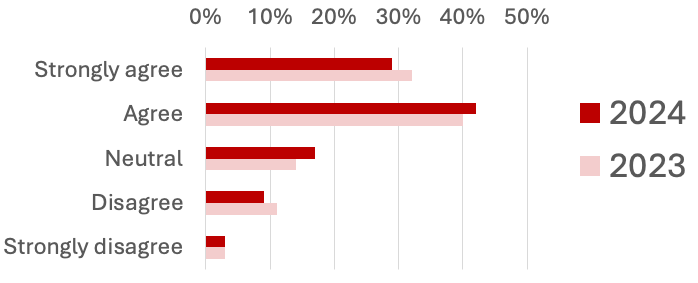
Building the Jeb E. Brooks School of Public Policy on a strong foundation of belonging is one of our priorities. Fostering a thriving academic community and building an ethos of collaboration are cross-cutting themes that run through our strategic priorities in research, education, and public engagement. We have important work ahead and envision many opportunities for meaningful engagement within our community. Please reach out to brooks_belonging@cornell.edu with your ideas, suggestions, and concerns.
Within our Cornell Brooks School community, no one should experience bias, intolerance, or bigotry. We encourage anyone who experiences or witnesses any act of bias or discrimination to report it here. Also, see University Policy 6.4 – Prohibited Bias, Discrimination, Harassment, and Sexual and Related Misconduct.
Belonging At Brooks Working Group
Events & Highlights
Check back soon for upcoming events.
Brooks School Initiatives to Advance the Next Generation
Resources
All Students, Faculty & Staff
All Students
Undergraduate Students
Graduate Students
Faculty, Post Docs, TAs & Staff
All Students
Undergraduate Students
Graduate Students
All Students, Faculty & Staff
All Students, Faculty & Staff
Belonging Data
The Belonging at Brooks Working Group designed a short survey that asks just 10 questions about belonging in Brooks, including a few open-ended items that allow respondents to share experiences and perspectives in their own words. The goal is to help us gain a better understanding of our community’s experiences—and to improve inclusion and belonging in Brooks.
A pilot version of the survey was first fielded in May of 2023 (N=154), and baseline data were collected in May of 2024 (N=326), with a response rate of 46% overall (42% among students, 55% among staff and faculty). Quantitative data are summarized below. Rich open-ended responses help provide context and direction for programmatic change to improve belonging in Brooks.
Sense of Belonging, All Respondents, 2024

Notes: 2023 (N=154) and 2024 (N=325) Brooks Belonging Survey. Responses to question: I feel a sense of belonging in Brooks.
Share Reporting Positively on 5 Items, Students and Staff/Faculty, 2024
| Sense of belonging (% agree or strongly agree) | Fair treatment (% agree or strongly agree) | Recommend Brooks (% agree or strongly agree) | Felt marginalized (% rarely or never) | Discriminatory comments (% rarely or never) | |
|
| Students (N=241) | 68% | 80% | 75% | 73% | 70% | |
| Staff and faculty (N=81) | 79% | 90% | 86% | 86% | 93% | |
| All (N=322) | 71% | 83% | 78% | 76% | 76% | |
Notes: 2024 Brooks Belonging Survey. Question wording is: I feel a sense of belonging in Brooks (strongly disagree to strongly agree); I am treated fairly in Brooks by my peers/colleagues (strongly disagree to strongly agree); I would recommend Brooks as a good place to work or study (strongly disagree to strongly agree); How often have you felt marginalized in Brooks due to an any element of your personal identity? (very often to never); How often have you heard someone in Brooks make an insensitive, disparaging, or discriminatory comment? (very often to never).



